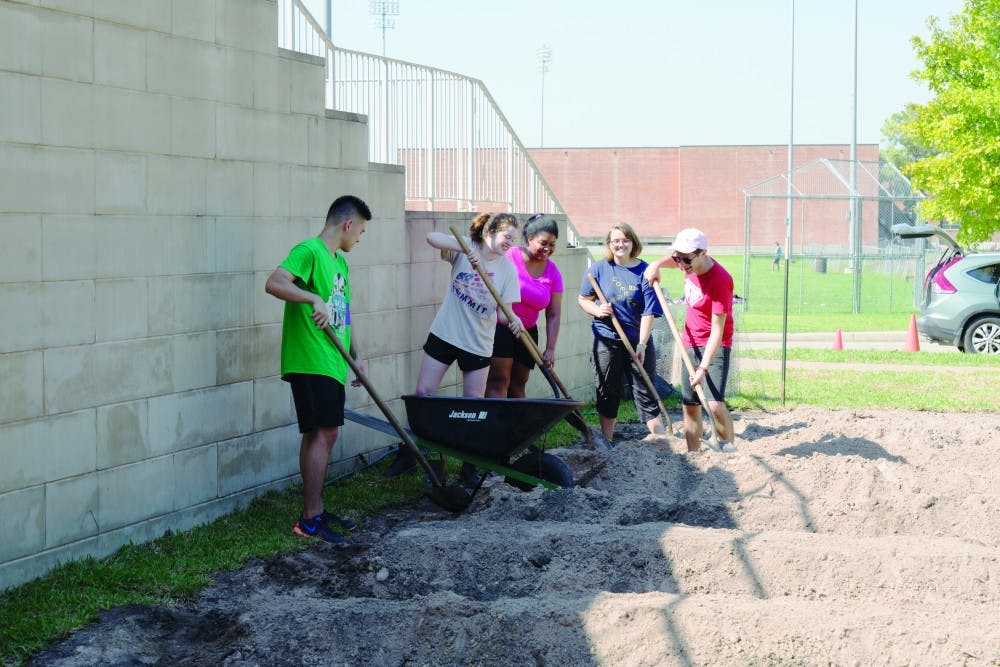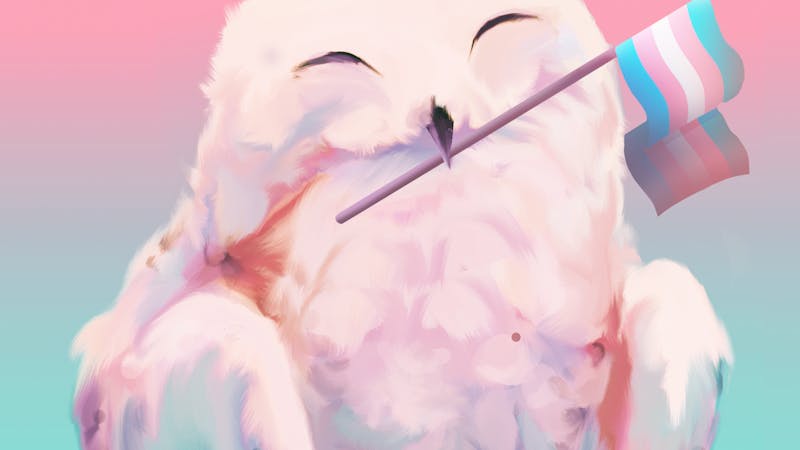Garden to table: community agriculture at Rice
Many students who dine at South Servery have no idea that some of the vegetables they eat everyday are grown in their own backyards.

Photo by Eva Ma
Seated behind his desk, Joseph Novak looks like any other professor. But seeing him work soil hand in hand with about 15 undergraduates under the hot sun of a Tuesday afternoon, the unique connection he has with his students becomes clear as day.
Novak, who came to Rice from Texas A&M University in 2014, teaches a course on community agriculture every semester. He is also the faculty advisor of Rice Urban Agriculture, a student run organization that oversees Rice’s community gardens.
“I’m 73,” Novak said. “At this point, I don’t ask a lot of questions. I just find that a lot of people are interested in what I’m trying to do and just come out and do it too.”
That was the case for Richard Arthur Goldman and Sebastian Gonzalez, two juniors at Lovett College who were inspired by Novak’s love of gardening.
“You take the class with Joe Novak and he’s basically a genius,” Goldman said. “He got me and Sebastian really passionate about gardening.”
While taking Novak’s course, Goldman and Gonzalez decided to bring their gardening skills to the second floor of Lovett, where they grew a variety of vegetables on the sundeck, including a turnip named Timmy Turner.
“Seeing the entire process, from when you have a seed to when it’s actually fruitful, when you can actually eat it, was incredible,” Gonzalez said, unable to keep a smile from his face. He is now vice president of RUA.
A requirement of Novak’s class is that students spend time actually working on the gardens. Currently, Rice has three gardens: one behind Martel College along Sunset Boulevard, one alongside South Servery and one along Wiess College, on the curve of Alumni Drive. Although the Rice website refers to these spaces as community gardens, Novak prefers another name.
“I call them holistic gardens. Holistic means for everybody,” he said.
This concept is central to Novak’s approach to gardening, which specialized tools, elevated gardening beds and plenty of benches to accommodate all people.
“Somebody who’s had a stroke, no reason they should not continue gardening. We just have to adapt the garden to meet their special needs,” he said.
Novak’s gardening philosophy also stresses sustainability, which has come to be a major focus of RUA.
The club, which was founded in the fall of 2015, has since developed a composting program. Max Ronkos, a senior at Lovett College and co-president of the club, fondly remembers the development of this program.
“It had been a long time coming,” Ronkos said. “Getting a golf cart that I was able to use, talking to the chefs, convincing them to save materials, and then finally being able to drive it around, going in through the back doors of the serveries, talking to people in there and just watching all of our compost materials start to pile up in the back of the golf cart was really cool.”
Ronkos heads RUA with Emily Foxman, fellow senior at Lovett College, whom he calls the “gardening czar.” Similar to Goldman’s and Gonzalez’s, Foxman’s passion for gardening started with Novak’s class, especially the physical gardening requirement.
“You’re sitting there watching a PowerPoint and you’re like, ‘Okay, yeah, gardening is nice,’ but gardening is so nice,” she said.
Like many fellow RUA members, Foxman came into the club with no prior gardening experience, but slowly grew from being unable to identify a cucumber plant to running entire gardens pretty much by herself. She’s spent her past two summers taking care of Rice’s gardens and using the produce she grows in her kitchen, an experience she called “meditative.” Food is very important to the members of RUA.
“The first time we grew snap peas, we were so into the snap peas. We ate so many snap peas,” Foxman said.
Ronkos shares her love of podded peas.
“There are some fruits and vegetables that you can get from the store and they’ll taste the same, but specifically sugar snap peas and tomatoes are exponentially better when they’re homegrown,” he said.
While some of the produce grown in Rice’s gardens is enjoyed by RUA members, most of it gets sold to the chefs at South Servery, an experience Gonzalez considers extremely valuable.
“It’s a side of these people that are behind the scenes that you don’t usually see,” Gonzalez said. “It takes all these intersecting places and brings them together.”
The club members are especially fond of Chef Ed Castillo, who runs the kitchen at North Servery and previously worked at South.
“He’s like, super into it. We’d talk to him and be like, ‘What do you want us to grow?’ And he’d be like, ‘I want beets! I want cilantro!’ And then we could do it. That was pretty neat,” Foxman said.
Foxman and Ronkos are exploring the possibility of developing a student-run business, where students would work in the gardens for an hourly wage that would be funded by the sale of produce.
But their current focus is on helping Novak with the development of a fourth Rice garden. This garden will exist along the Media Center, and will reflect the values of community and sustainability so central to Novak and RUA. Novak has secured a grant for its development and hopes to complete it by second semester.
Among his plans for the space are a fruit orchard, a butterfly garden, a storytelling area and an African keyhole garden, a raised plant bed made out of recycled materials. He also hopes to create a space where students can escape the rush of campus.
“You’re out in the middle of everything when you’re sitting at most places on campus, and some people really want to focus and concentrate,” Novak said. “Nature is restorative, it really helps you relax, calms you. So we want little pockets of places for students to just sit, relax and think.”
Novak is counting on student involvement to develop this garden and hopes to create a space where he can share his love of gardens with a broader set of people.
“That’s what I’m trying to do with these students at Rice, show them all these magical things that happen in a garden,” Novak said. “Few things are more beautiful than a bluebird singing in the spring.”
More from The Rice Thresher

‘An investment in our future’: Meet Ruth López Turley
Ruth López Turley, director of the Kinder Institute for Urban Research, doesn’t have it easy. She oversees all of the organization’s research operations, raises the money to fund its work and describes herself as constantly in meetings. On top of that, she’s still teaching in her role as a Rice sociology professor. When López Turley thinks about hard work, however, she doesn’t think of jobs like hers.

Trans students at Rice talk difficulties, community
What is community? For Marina Klein, it’s little queer people in your phone, chatting and exchanging compliments and advice in a GroupMe. “[People in the group chat are] so supportive … they’re always there for you when you need them to be,” Klein, a McMurtry College sophomore, said. “You can be there for them when you have the time as well, because that’s how community works.”

Diving into the DEEP with Rice’s Data Science Club
Data Education and Exploration Program is an annual data science showcase competition put on by Rice’s Data Science Club, open to all levels of coding experience. According to Vinay Tummarakota, president of the Data Science Club, the program consists of a semester-long workshop series that alternates between lessons where senior Data Science Club students teach curriculum, and application-style workshops where mentors help students apply skills learned the week before. Over the course of the fall semester, student teams develop projects on their chosen data set, and eventually present in a final showcase.

Please note All comments are eligible for publication by The Rice Thresher.